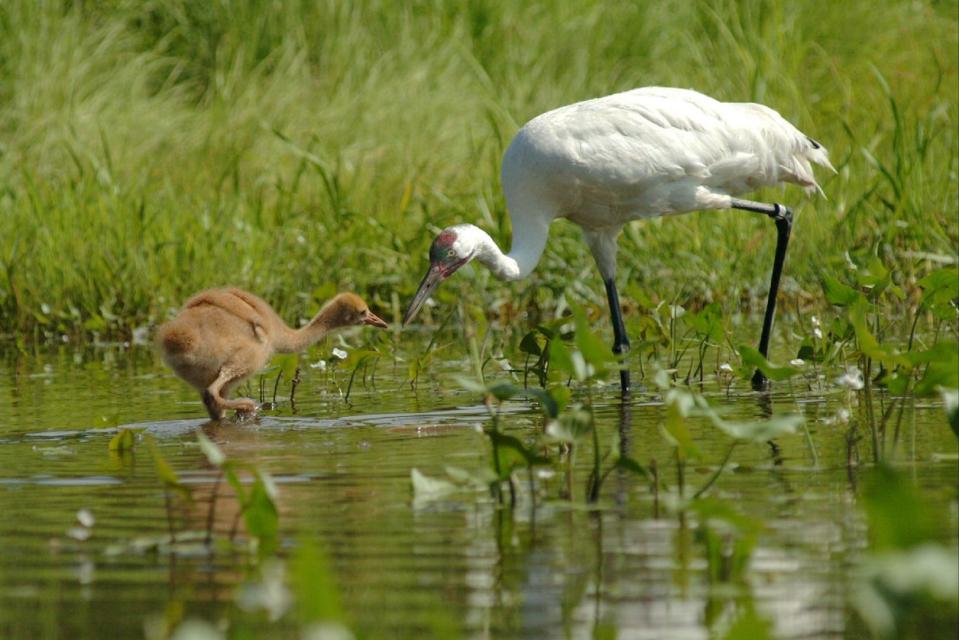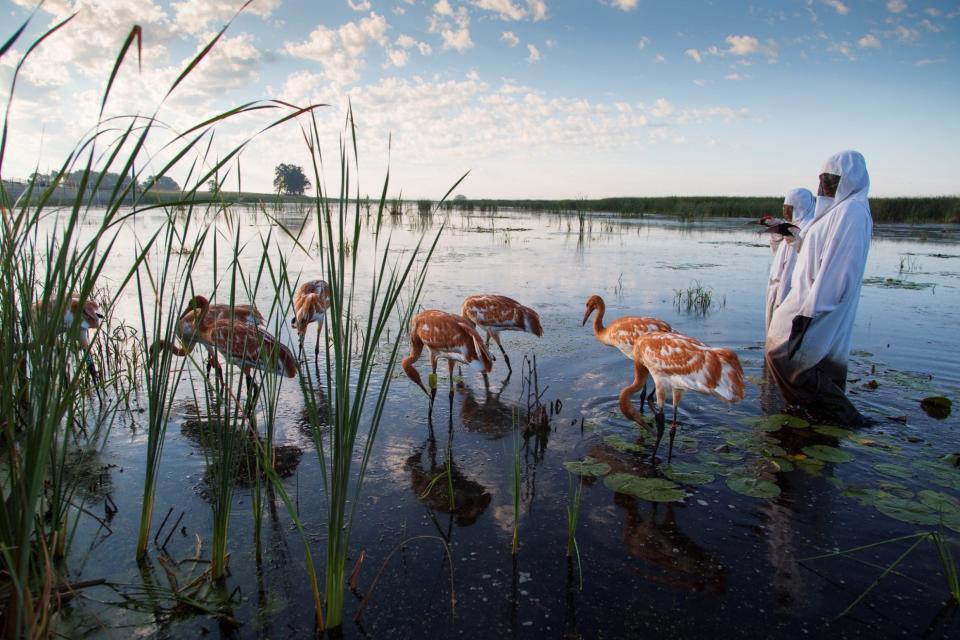Smith: Founded on hope, International Crane Foundation is a 50-year global success story
BARABOO – The International Crane Foundation started as an idea hatched in 1973 by a pair of 20-something college graduates, George Archibald and Ron Sauey.
The original quarters was a stable on a horse farm. The primary assets were optimism, faith and intellect.
Most crane species worldwide were declining in the early 1970s. Only about 50 whooping cranes remained in the wild, for example, and many biologists expected the species to go extinct.
And no group had been so audacious as to try to work on all of the world's 15 crane species.
But from its humble beginning Baraboo-based ICF would become the global leader in crane conservation.
Among its accomplishments: the ICF was the first to breed Siberian and hooded cranes in captivity; it has had a key role in whooping crane recovery; it has established conservation partnerships in nearly 60 countries and protect millions of acres of wetlands; it has established an education and research center as well as a home for all 15 crane species at its headquarters in Baraboo.
Perhaps only Archibald and Sauey were not surprised.
"From the very beginning I knew that cranes were wonderful and because of that I knew our organization would grow and be beautiful," said Archibald, 77, in a Friday interview from his home near Baraboo.
The ICF will celebrate its 50th anniversary at events Saturday in Baraboo and Wisconsin Dells.

More: Outdoors calendar
Crane Foundation has grown from two founders to more than 160 staff members and interns worldwide
From its original two staff members, the organization has expanded to about 60 staff and 24 interns each year in Baraboo as well as about 80 staff around the rest of the world, including 60 in Africa, according to ICF president and CEO Rich Beilfuss.
In addition to its Baraboo headquarters, ICF has offices and staff in Texas as well as China, Kenya, South Africa, Uganda and Zambia.
The organization leverages its impact through partnerships with local organizations, governments, universities, businesses and others groups on five continents.
"Where ever you find cranes, we have a presence," said Beilfuss, who has led the organization since 2010.

Grad students launched ICF in 1973 on a Sauk County farm
The ICF story dates to 1971 when Archibald and Sauey were Cornell University graduate students with a passion for cranes. The men envisioned an organization unlike any at the time that would combine research, captive breeding and reintroduction, landscape restoration and education to safeguard the world’s 15 crane species.
After they graduated, they found a spot in Sauk County in 1973 to begin their quest. Sauey's parents rented space on their Baraboo horse farm to the ICF founders for $1 a year.
The farm would become famous as the location of the first captive breeding of Siberian and hooded cranes as well as Archibald's courtship dancing with Tex, a captive whooping crane, to initiate ovulation in the bird.
Sauey suffered a cerebral hemorrhage and died in 1987 at the age of 38. Archibald served as organization's initial president and CEO and is now senior conservationist and a life member of the ICF board of directors.
The organization eventually outgrew the Sauey horse farm and is now based on a 260-acre site near Baraboo. The property includes offices, research pens, a visitor center and "Cranes of the World," outdoor exhibitions of the 15 crane species.
About 100 to 120 cranes are housed at ICF annually, including about 70 in the organization's breeding facility, a critical site for rearing young cranes for release into the wild or increasing captive flocks.

Cranes species are some of the most threatened birds in the world
With some species standing more than 6 feet, cranes are the tallest flying birds in the world.
They are also often referred to as the most threatened bird family in the world. Of the 15 species, four are classified as endangered (the grey crowned, red-crowned, Siberian and whooping) and seven as vulnerable (black crowned, black-necked, blue, hooded, Sarus, wattled and white-naped).
Beilfuss said although challenges of crane conservation were great – including loss of wetland habitat and illegal hunting – progress has been made in many areas due to unique collaborations and effective community-based programs.
"Cranes are iconic, inspirational species and people mostly are willing to share the earth with them," Beilfuss said. "With cranes as flagships, we know conservation programs can succeed."
Beilfuss said cranes are revered in many cultures around the world, including Buddhist and Hindu and Native American.
Further, cranes need large, healthy wetlands to live and breed and serve as indicators of environmental health.
"Because they are so big and conspicuous and culturally connected, they are also helpful in highlighting our ecological needs," Beilfuss said.
Crane conservation efforts have been key to protect wildlife habitat in the U.S. and many other countries. Examples include Aransas National Wildlife Refuge in Texas, Mississippi Sandhill Crane Refuge in Mississippi and Malheur National Wildlife Refuge in Oregon.
In addition, six national crane reserves have been established in the Mekong Delta in southeast Asia, 46 national crane reserves protect 71 million acres in China and Ramsar "Wetlands of International Importance" for cranes are found in 20 African countries.
"So cranes are flagships for protected areas, and when you protect wetlands or habitat for cranes, many other species of wildlife benefit," Beilfuss said.

International Crane Foundation works with neighboring communities
The flip side is everywhere ICF works, they work with the people in the surrounding communities.
"You have humans surrounding the protected area and needing resources," Beilfuss said. "We acknowledge that and work with farmers and others to find solutions to benefit everyone."
Beilfuss said in rural areas of Africa and Asia local projects have succeeded in protecting both crane habitat and improving the income of local farmers.
There is no end to the challenges, of course. Climate change, human development, chemical contamination and political strife complicate global crane conservation.
Yet nothing has diminished Archibald's enthusiasm.
His motto is "don't criticize but encourage."
ICF co-founder George Archibald looks to continue expansion of conservation efforts
"We learn from cranes and we keep going," Archibald said. "That's what life is. In hard times you can grow much more than when everything is golden. I am a person of faith and I'm grateful for all the blessings."
Archibald said the ICF has grown beyond his wildest dreams. He considers British naturalist David Attenborough a role model and "God willing" he'd like to keep working into his 90s.
Archibald said his current dream is to reestablish a migratory flock of Siberian cranes through Afghanistan.
Based on the 50-year history of ICF, don't bet against it.
"If young people have a dream, it can be realized if you work hard," Archibald said. "That's what I plan to keep doing."
Great Midwest Crane Fest coming in November
The International Crane Foundation and Aldo Leopold Foundation will host the second annual Great Midwest Crane Fest on Nov. 10 and 11 at locations in Baraboo. The event will include crane viewing tours as well as indoor workshops and presentations. For more information, visit greatmidwestcranefest.org or call (608) 356-9462 extension 807.
THANK YOU: Subscribers' support makes this work possible. Help us share the knowledge by buying a gift subscription.
DOWNLOAD THE APP: Get the latest news, sports and more
This article originally appeared on Milwaukee Journal Sentinel: International Crane Foundation in Baraboo celebrates 50th anniversary

